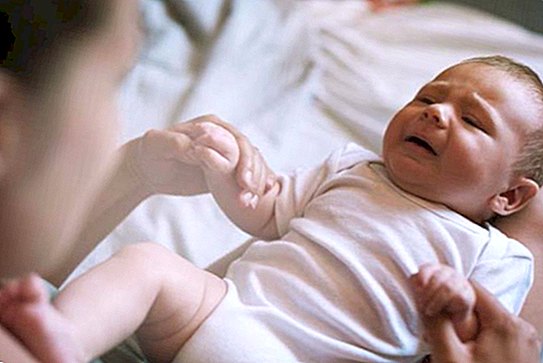How to relieve the discomfort of the baby if you have reflux

The Reflux in babies it is very common. It is a common problem that affects babies during their first months of life, and that is medically known as Gastroesophageal reflux in babies, although it is true that it is a situation that can arise any person (adults, children or babies).
When a baby has reflux it means that when the milk that the baby has taken is in his stomach, he tends to go back to the esophagus, but it is made bitter by the different gastric juices present in the stomach, passing to the esophagus and from there to mouth.
In any case, it is a problem caused by the Cardia malfunction, which consists of a valve located between the esophagus and the stomach, which is responsible for preventing, once taken the food, it goes back up the esophagus (ie, stops the contents of the stomach to prevent back to the esophagus). Specifically, many pediatricians consider that it occurs due to incomplete development of this small valve.
What are the symptoms that warn of possible reflux in the baby?
When the baby suffers from reflux it is common to tend to regurgitate between tetada and tetada(or between bottle and bottle, if you are taking artificial milk). It is usual that, in fact, this regurgitation occurs between four to five hours after the last meal, just at the time when appetite may appear again.
The truth is that regurgitation is a natural mechanism of self-regulation, by which the newborn expels excess milk, especially when it has not yet been digested. That is to say, it is a physiological phenomenon, totally and absolutely normal.
This causes discomfort and discomfort in the baby, which in turn causes cries and agitation, which is why gastroesophageal reflux is usually confused with Colic, although unlike these, the reflux tends to continue after the third month (which is, however, when colic usually disappear).

What can mom and dad do to alleviate the discomfort and symptoms associated with reflux?
There are a number of basic tips that can help not only to relieve the discomfort associated with gastroesophageal reflux in the baby, but to prevent it. For example, during the meal it is advised that the child be in an upright or sitting position. Then, after the meal, you should let him burp, in this way it will eliminate the air that has been ingested during the intake.
In addition, it is recommended Do not place it immediately in the crib, but leave it semitumbado and avoid shaking.
In any case, if the discomfort associated with reflux has appeared, it is recommended:
- Have the baby rest on his back, with his head higher than his feet. Remember that experts do not recommend letting the baby sleep on his stomach, as it increases the risk of sudden death syndrome.
- Check that the diaper does not tighten. Otherwise, it is advisable to loosen it as far as possible.
It is also very useful to give less amount of breast milk or formula in each shot, compensating him by feeding him more times. This way it will not be so full.
Images | Istockphoto
Bibliography:
- NASPGHAN Coping when your baby has reflux or GERD. North American Society for Pediatric Gastroenterology, Hepatology, and Nutrition.
- Mayo Clinic Without date. Infant Gastric Reflux. Available at: //www.mayoclinic.org/es-es/diseases-conditions/infant-acid-reflux/symptoms-causes/syc-20351408


